Full Stack java
August 25, 2020 2025-12-15 10:49Full Stack java
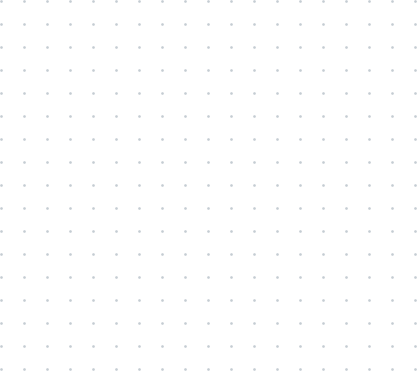

Become a Full Stack Java Developer – Secure Your Dream Job
Master Full Stack Java Development with hands-on training, expert mentorship, and placement support. start your journey toward a successful IT career today! Full Stack Java Developer Course in Pune
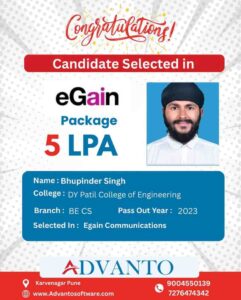
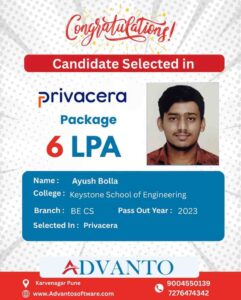
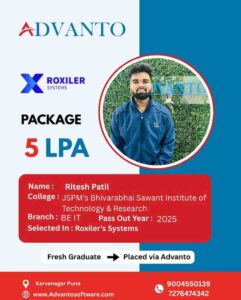
Get Skills That Get You Hired
Lectures & Assignments curated by Top Tech Professionals
Unlimited Placement Calls from Day 1
From the very first day, we ensure our candidates receive unlimited placement calls, giving them maximum opportunities to connect, interview, and secure their dream roles with our hiring partners.
We build your technical foundation, enhance your practical skills, and prepare you for real-world interviews through:
💡 Live Project Experience
💼 Mock Interviews with Experts
🧠 Aptitude & Soft Skills Training
📈 Career Counseling and Resume Building

Watch yourself transform your future


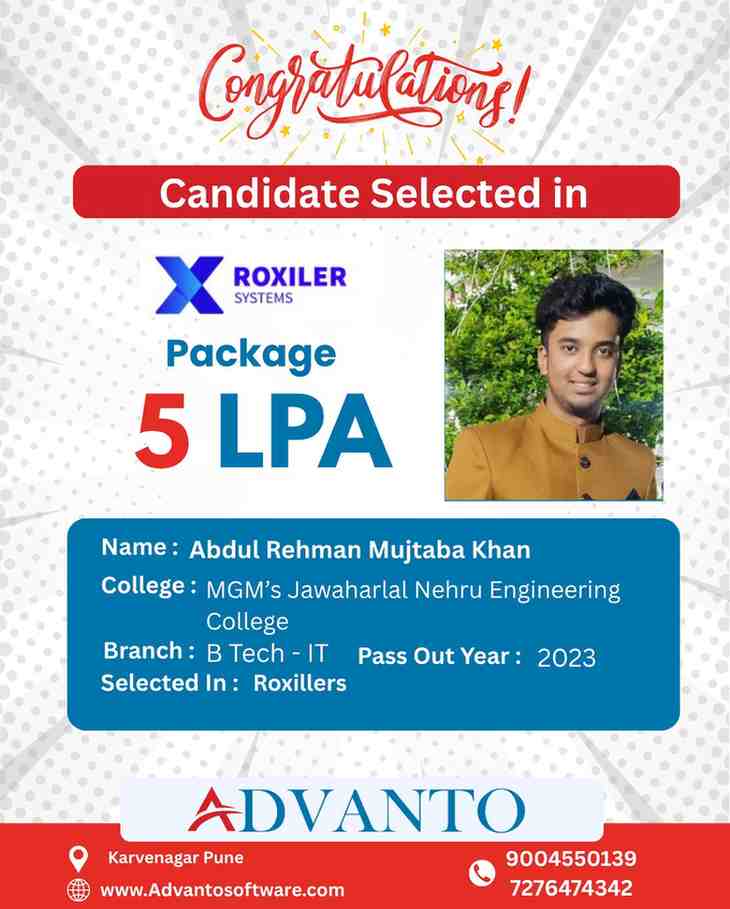



Our Hiring Patners
You can list your partners or instructors's brands here to show off your site's reputation and students can trust you more.















Comprehensive Full Stack Java Syllabus.
Designed for Industry Readiness with Practical, Hands-on Implementation
The Full Stack Java Developer Course in Pune offered by Advanto infotech is a specialized, job-oriented training program designed for individuals aiming to build a successful career in web development. This comprehensive course covers everything from developing complex server-side web applications to configuring secure Linux-based servers and deploying cloud-hosted solutions using powerful relational databases.
A Java Full Stack Developer is proficient in all areas of web development, including front-end (UI), back-end (business logic), APIs, data modeling, and the MVC architecture. This course ensures you understand both client and company requirements while building robust applications.
Our training is delivered by highly experienced and qualified professionals who have in-depth industry expertise. They are committed to providing relevant, hands-on knowledge to help students excel in their careers.
Course Fees and Duration
Advanto Infotech offers the Full Stack Java Course in Pune at highly affordable rates with flexible payment options. Our fee structure is among the most competitive in the industry.
Duration:
Weekday Batch: 5 Months
For more details about fees, course structure, and batch timings, visit our offices at Karve Nagar..
Eligibility Criteria
- Graduates from BE/B.Tech, B CS, BCA, BSc, M.Sc, MCA, M.E/M.Tech
Final year students awaiting results are also eligible to apply.
100% Unlimited Placement Calls
Advanto infotech is one of Pune’s most trusted Java Full Stack Developer training institutes with a proven track record. We provide 100% unlimited placement Calls.
Unlimited placement calls
Personalized interview preparation
Resume building and mock sessions
With over 12 years of training experience, we’ve successfully placed hundreds of students in top MNCs and IT companies. Completing this course gives you a near-guaranteed pathway to employment in the tech industry.
Full Stack Java Developer Course in Pune Content
HTML
Introduction to HTML
 Basic Structure of HTML
Basic Structure of HTML HTML Editors
HTML Editors HTML Tags
HTML Tags Paragraphs, Headings and Text
Paragraphs, Headings and Text Formatting Tags
Formatting Tags HTML Lists
HTML Lists HTML Images
HTML Images HTML Tables
HTML Tables HTML Forms
HTML Forms HTML Media
HTML Media
CSS (Cascading Style Sheets)
 Introduction to CSS
Introduction to CSS Types of CSS
Types of CSS CSS Properties, Selectors and Values
CSS Properties, Selectors and Values Applying CSS to HTML
Applying CSS to HTML Paragraphs, Headings and Text
Paragraphs, Headings and Text CSS Box Model, Margins, Padding, Borders
CSS Box Model, Margins, Padding, Borders CSS Text & Font Formats
CSS Text & Font Formats CSS Advanced Topics (Effects, Animations, Shadows, Etc..
CSS Advanced Topics (Effects, Animations, Shadows, Etc..
Javascript
 Introduction to JavaScript
Introduction to JavaScript How to Apply JavaScript
How to Apply JavaScript Displaying Output in JavaScript
Displaying Output in JavaScript Understanding JavaScript Syntax
Understanding JavaScript Syntax Variables & Datatypes
Variables & Datatypes Operators
Operators Math and String Manipulations
Math and String Manipulations Conditional and looping Statements
Conditional and looping Statements Functions
Functions Validations
Validations Events
Events
Bootstrap
- Introduction to Bootstrap
 Bootstrap Setup
Bootstrap Setup Bootstrap Containers
Bootstrap Containers Bootstrap Grids
Bootstrap Grids Bootstrap Tables
Bootstrap Tables Bootstrap Buttons, Navbars, Alerts
Bootstrap Buttons, Navbars, Alerts Bootstrap Carousel
Bootstrap Carousel Bootstrap Forms
Bootstrap Forms
Angular
 Introduction to Angular
Introduction to Angular Environment Setup
Environment Setup Installing Angular CLI
Installing Angular CLI Directory Structure of Angular
Directory Structure of Angular Angular Fundamentals
Angular Fundamentals Angular Building Blocks
Angular Building Blocks Angular Data Binding
Angular Data Binding String Interpolation
String Interpolation Directives and Pipes
Directives and Pipes Forms
Forms Approaches (Driven & Reactive)
Approaches (Driven & Reactive) Validators
Validators Routing
Routing
Java
- Introduction to Java
 Java LanguageJava Platform
Java LanguageJava Platform Java Technologies
Java Technologies History of Java
History of Java Execution Model Of Java
Execution Model Of Java First Java Program
First Java Program The JDK Directory Structure
The JDK Directory Structure Eclipse IDE
Eclipse IDE Similarities between C and Java
Similarities between C and Java Defferences between C and Java
Defferences between C and Java Standard Edition of Java
Standard Edition of Java JDK
JDK Path
Path Classpath
Classpath
Data types
- What are data types?
 Int
Int Float
Float Char
Char Double
Double Boolean
Boolean Short
Short Long
Long Bytes
Bytes
Methods
 What are Methods?
What are Methods? Method Structure
Method Structure Declaration Of Methods
Declaration Of Methods Calling Of Methods
Calling Of Methods Defining Methods
Defining Methods Method Parameters Scope
Method Parameters Scope Why static methods?
Why static methods?
Control Flow Statements
- What are Control Flow Statements?
 If Statement
If Statement else if Statement
else if Statement Conditional (Switch) Statements
Conditional (Switch) Statements
Operators
- Arithmetic Operators
 Relational Operators
Relational Operators Logical Operators
Logical Operators Conditional Operator
Conditional Operator Precedence Operator
Precedence Operator Cast Operator
Cast Operator
Loops
 For Loop
For Loop While Loop
While Loop Do While Loop
Do While Loop Break Statements
Break Statements
Object-Oriented Programming(OOPs)
- Overview of OOP
 Class and Object
Class and Object Encapsulation
Encapsulation Attributes (Properties)
Attributes (Properties) Operations (Methods)
Operations (Methods) Reference Vs Object
Reference Vs Object Real-time Object Oriented Examples
Real-time Object Oriented Examples
Constructor
 No Argument Constructor
No Argument Constructor Parameterized Constructor
Parameterized Constructor Constructor Overloading
Constructor Overloading Explicit Vs Implicit Default Constructor
Explicit Vs Implicit Default Constructor
Wrapper Classes Accessibility Mode
 Private
Private Protected
Protected Default
Default Public
Public
Inter Object Communication
 Message
Message Message Passing
Message Passing Message Sender
Message Sender Message Receiver
Message Receiver
Arrays
- What is an array?
 Declaring an array
Declaring an array Initializing an array
Initializing an array One Dimentional array
One Dimentional array Two Dimentional arrays
Two Dimentional arrays Multi Dimentional arrays
Multi Dimentional arrays
Static Modifier
- Static Variables
 Static Methods
Static Methods Static Blocks
Static Blocks Static Classes
Static Classes
Inheritance
 Inheritance in Java
Inheritance in Java Use of Inheritance
Use of Inheritance Single Inheritance
Single Inheritance Multi-level Inheritance
Multi-level Inheritance Hierarchical Inheritance
Hierarchical Inheritance Hybrid Inheritance
Hybrid Inheritance
Polymorphism
- Introduction to Ploymorphism
 Method Overloading
Method Overloading Method Overriding
Method Overriding Super ClassSub Class
Super ClassSub Class Abstract Classes
Abstract Classes Abstract Methods
Abstract Methods Static Polymorphism
Static Polymorphism Dynamic Polymorphism
Dynamic Polymorphism Static Vs Dynamic Polymorphism
Static Vs Dynamic Polymorphism
Interface
 Interfaces Vs Abstract Class
Interfaces Vs Abstract Class Role of Interfaces in Real time
Role of Interfaces in Real time Interfaces Inheriting from other Interfaces
Interfaces Inheriting from other Interfaces Declarative Multiple Inheritance using Interfaces
Declarative Multiple Inheritance using Interfaces
Packages
 What is a Package?
What is a Package? Advantages of Packages
Advantages of Packages Types Of Packages
Types Of Packages Naming Convention
Naming Convention Steps For Creating Packages
Steps For Creating Packages The import Statement
The import Statement Static Imports
Static Imports Defining Packages
Defining Packages Scope of Packages
Scope of Packages
String Handling
- String
 String Buffer
String Buffer String Handler
String Handler
Exception Handling
 Types of errors
Types of errors Need of Exception Handling
Need of Exception Handling Try, Catch, throws, Finally
Try, Catch, throws, Finally Try with resources
Try with resources Exception Hierarchy
Exception Hierarchy User Defined Exceptions
User Defined Exceptions
IOSTREAMS
- Byte-Oriented Streams
 Character Oriented Streams
Character Oriented Streams Java.Io.File Class
Java.Io.File Class Object Serialization
Object Serialization
Multithreading
 Multi-tasking Vs Multi threading
Multi-tasking Vs Multi threading Life Cycle of Thread
Life Cycle of Thread Java.lang.thread Vs Java.lang.runnable
Java.lang.thread Vs Java.lang.runnable Developing Multithreaded Applications
Developing Multithreaded Applications Synchronization
Synchronization DeadLock
DeadLock Inter-thread communication
Inter-thread communication
Inner Classes
- Inner Class
 Nested Class
Nested Class Different types of Nested Classes
Different types of Nested Classes
Miscellaneous
- Java.lang.object Class
 Garbage Collection
Garbage Collection Java.util.properties
Java.util.properties Java.util.string Tokenizer
Java.util.string Tokenizer Dealing with date & time
Dealing with date & time Collection Framework
Collection Framework Annotations
Annotations Java JDK 1.8 Features
Java JDK 1.8 Features Stream API
Stream API Varargs
Varargs Autoboxing and unboxing
Autoboxing and unboxing Enum types
Enum types
JDBC
 Introduction To JDBC
Introduction To JDBC JDBC Architecture
JDBC Architecture Types Of JDBC Drivers
Types Of JDBC Drivers Creating a Database & Table
Creating a Database & Table Getting Information from Database
Getting Information from Database Obtaining Result Set Information
Obtaining Result Set Information Connecting a Java Program to DB
Connecting a Java Program to DB Prepared Statement & Statment classes in java
Prepared Statement & Statment classes in java Inserting, Updating & Deleting data
Inserting, Updating & Deleting data
Java Servlets
- What is a Web Application
 Java Servlets
Java Servlets Servlets Lifecycle
Servlets Lifecycle Servlets Context
Servlets Context Session Management
Session Management Building the First Servlet
Building the First Servlet Deploying the Servlet
Deploying the Servlet
Spring Boot
 What is a Web Application
What is a Web Application Java Servlets
Java Servlets Servlets Lifecycle
Servlets Lifecycle Servlets Context
Servlets Context Session Management
Session Management Building the First Servlet
Building the First Servlet Deploying the Servlet
Deploying the Servlet
JSP
 What is a JSP page
What is a JSP page Basic HTML tags
Basic HTML tags JSP Tag Library
JSP Tag Library JSP Page Lifecycle
JSP Page Lifecycle Creating first dynamic web page
Creating first dynamic web page
MVC Architecture
 Introduction to MVC
Introduction to MVC MVC Architecture
MVC Architecture Advantages of MVC
Advantages of MVC Building pages with MVC
Building pages with MVC Three-tier architecture
Three-tier architecture
Struts Framework
 Introduction to MVC
Introduction to MVC MVC Architecture
MVC Architecture Advantages of MVC
Advantages of MVC Building pages with MVC
Building pages with MVC Three-tier architecture
Three-tier architecture
Introduction Actions Validation Framework Interceptors Results Data Tags UI Tags
 Introduction to MVC
Introduction to MVC MVC Architecture
MVC Architecture Advantages of MVC
Advantages of MVC Building pages with MVC
Building pages with MVC Three-tier architecture
Three-tier architecture
Hibernate Framework
- Technologies for Persistency
 Introduction to ORM
Introduction to ORM Hibernate Architecture
Hibernate Architecture Hibernate API
Hibernate API Configuration Properties
Configuration Properties CRUD Operation
CRUD Operation Inheritance in Hibernate
Inheritance in Hibernate Component Mapping
Component Mapping Collection Mapping One-to-many, Many-to-many Relations
Collection Mapping One-to-many, Many-to-many Relations Inheritance in Hibernate
Inheritance in Hibernate HQL (Aggregate Function ,clauses ,Criteria)
HQL (Aggregate Function ,clauses ,Criteria)
Spring Framework
 Introduction to Spring
Introduction to Spring IOC
IOC DI
DI AOP
AOP Bean Lifecycle
Bean Lifecycle Types of Injection
Types of Injection Inheritance & Composition
Inheritance & Composition Collections
Collections Bean Auto Wiring
Bean Auto Wiring DAO
DAO
XML and WEb Services
- SAX & DOM
 REST API
REST API POSTMAN
POSTMAN SOAP UI
SOAP UI JSON
JSON
Testing and Web Services Development
 JUNIT
JUNIT TestNg
TestNg DevOps
DevOps Jenkins
Jenkins Maven
Maven Angular JS
Angular JS

